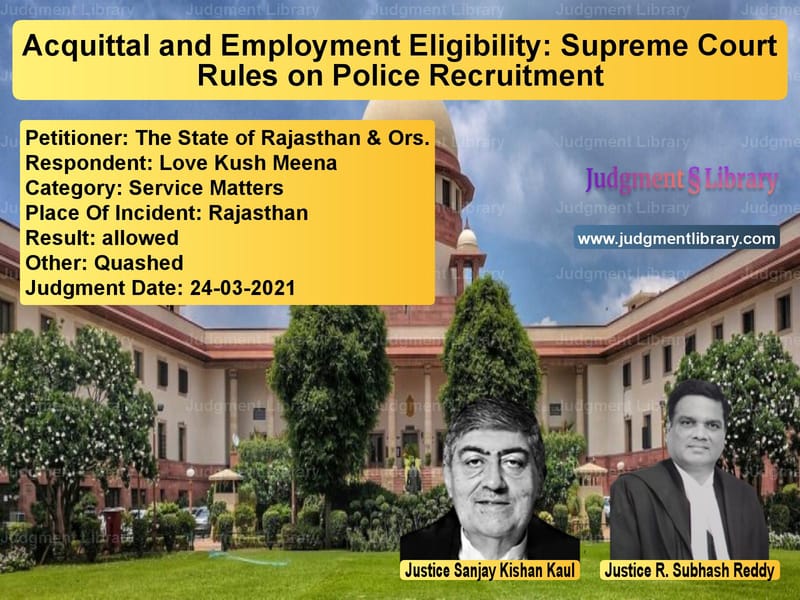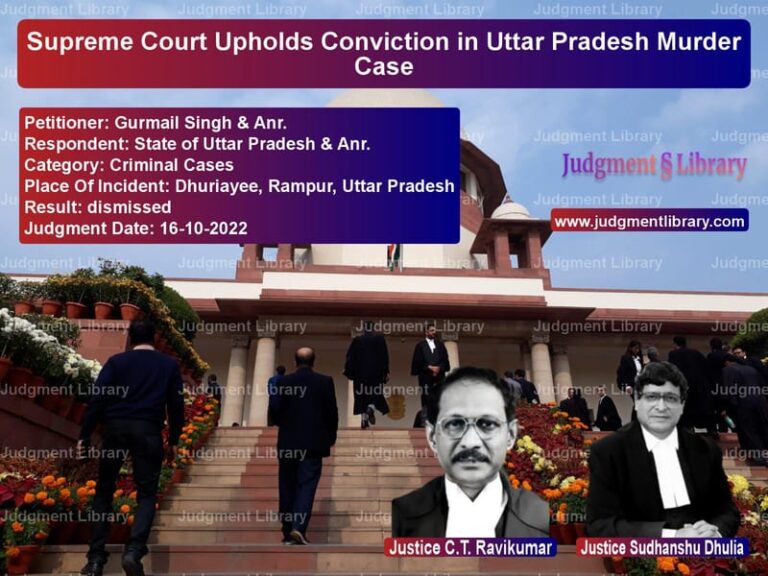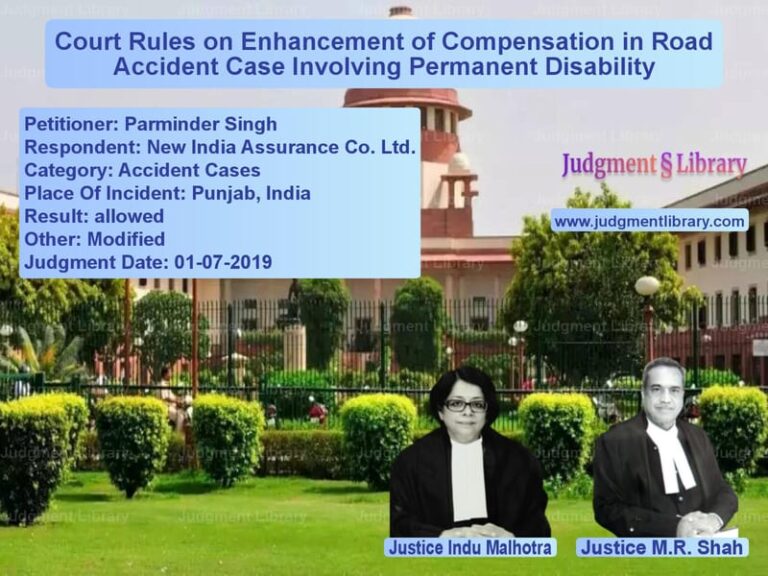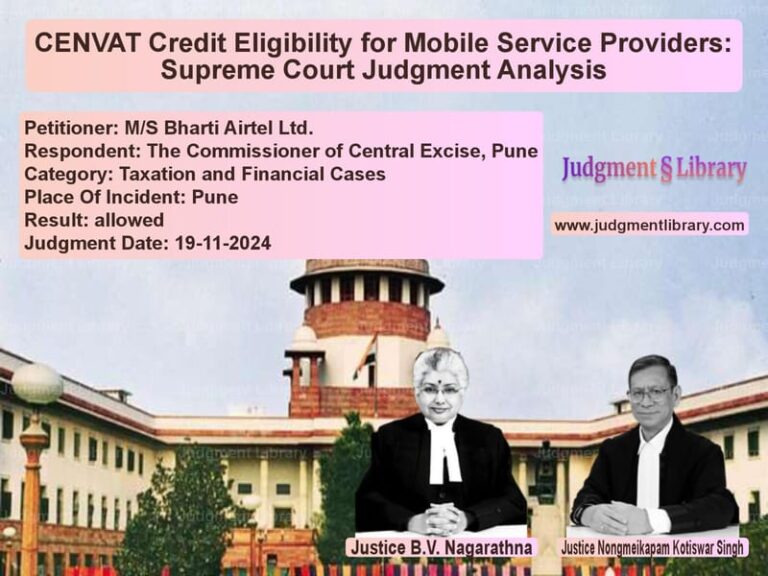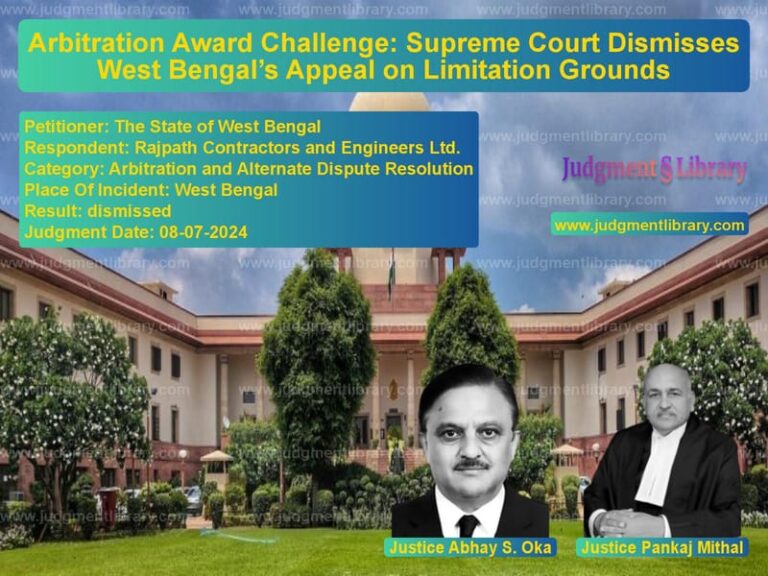Acquittal and Employment Eligibility: Supreme Court Rules on Police Recruitment
The Supreme Court of India delivered a crucial judgment in the case of The State of Rajasthan & Ors. vs. Love Kush Meena on March 24, 2021. This case addressed the eligibility of a candidate for police service after being acquitted on the basis of the benefit of doubt in a criminal case involving serious charges. The ruling clarified whether such an acquittal is equivalent to a ‘clean acquittal’ and if it affects the right to public employment, especially in sensitive roles like police service.
Background of the Case
The respondent, Love Kush Meena, was charged under Sections 302, 323, and 341/34 of the Indian Penal Code (IPC) in connection with an incident where a woman named Tofli was allegedly run over by a tractor, leading to her death. The complainant and other witnesses also sustained injuries. The trial court acquitted the accused, including the respondent, stating that the prosecution failed to prove the case beyond a reasonable doubt.
Subsequently, in 2013, a notification was issued for the recruitment of constables in the Rajasthan Police. The notification included a clause stating that candidates should not have been convicted of offenses involving moral turpitude or violent activities and should have been ‘honourably acquitted’ if charged with such offenses. The respondent, despite disclosing his prior acquittal, was deemed ineligible for appointment based on his antecedent verification.
Arguments by the Petitioner (State of Rajasthan)
- The State contended that the respondent was not ‘honourably acquitted’ but was instead acquitted based on a lack of evidence, which is different from a clean acquittal.
- The recruitment notification clearly disqualified individuals who had been acquitted on the basis of the benefit of doubt.
- The appointment of individuals with a criminal background in the police force would compromise public trust and integrity.
- The State relied on the precedent set in Avtar Singh v. Union of India & Ors., where the Supreme Court held that the nature of acquittal is crucial in determining eligibility for government service.
Arguments by the Respondent (Love Kush Meena)
- The respondent argued that he had fully disclosed his past criminal case in his application.
- He claimed that as per a circular issued by the Rajasthan government in 2017, even candidates acquitted based on the benefit of doubt were eligible for police recruitment.
- He cited previous Rajasthan High Court rulings that had granted relief to similarly situated candidates.
- The respondent also referred to Mohammed Imran v. State of Maharashtra, where the Supreme Court held that minor or old criminal charges should not automatically disqualify candidates from public employment.
Supreme Court’s Observations
The Supreme Court examined multiple precedents, including Avtar Singh, Inspector General of Police v. S. Samuthiram, and State of Madhya Pradesh v. Abhijit Singh Pawar. The key observations were:
- An acquittal based on the benefit of doubt is not the same as an ‘honourable acquittal.’
- A candidate’s antecedents and the severity of charges must be considered when determining eligibility for sensitive public employment roles.
- The recruitment process for police officers requires high standards of integrity and character.
- Government authorities have the discretion to disqualify candidates based on past criminal charges, even if they were acquitted.
- The 2017 Rajasthan government circular, which allowed candidates acquitted based on benefit of doubt to be eligible for recruitment, cannot override judicial principles laid down in previous Supreme Court rulings.
Key Excerpts from the Judgment
“The view of this Court has depended on the nature of the offense charged and the result of the same. The mere fact of an acquittal would not suffice but rather it would depend on whether it is a clean acquittal based on the total absence of evidence or if the benefit of doubt has been granted.”
“We are of the view that this can hardly fall under the category of a clean acquittal, and the Judge was thus right in using the terminology of benefit of doubt in respect of such acquittal.”
Final Judgment
The Supreme Court ruled in favor of the State of Rajasthan and set aside the Rajasthan High Court’s order directing the respondent’s appointment. The Court held that:
- A person acquitted on the basis of the benefit of doubt in a serious criminal case cannot claim an absolute right to government employment.
- Employers, especially in law enforcement, have the discretion to assess the suitability of candidates based on their antecedents.
- The rejection of the respondent’s candidature was legally valid and justified.
Implications of the Judgment
This ruling has significant implications for government recruitment, particularly for law enforcement and security services:
- It establishes that an acquittal due to a lack of evidence does not automatically entitle a candidate to government service.
- It reinforces the importance of maintaining high ethical and integrity standards in police recruitment.
- It allows recruiting authorities to exercise discretion in assessing the character and antecedents of candidates.
- It provides clarity on the legal interpretation of ‘honourable acquittal’ versus acquittal based on the benefit of doubt.
The judgment ensures that individuals charged with serious offenses, even if later acquitted on technical grounds, do not gain automatic eligibility for sensitive public employment roles, thereby upholding the credibility and trustworthiness of public institutions.
Petitioner Name: The State of Rajasthan & Ors..Respondent Name: Love Kush Meena.Judgment By: Justice Sanjay Kishan Kaul, Justice R. Subhash Reddy.Place Of Incident: Rajasthan.Judgment Date: 24-03-2021.
Don’t miss out on the full details! Download the complete judgment in PDF format below and gain valuable insights instantly!
Download Judgment: the-state-of-rajasth-vs-love-kush-meena-supreme-court-of-india-judgment-dated-24-03-2021.pdf
Directly Download Judgment: Directly download this Judgment
See all petitions in Recruitment Policies
See all petitions in Public Sector Employees
See all petitions in Termination Cases
See all petitions in Judgment by Sanjay Kishan Kaul
See all petitions in Judgment by R. Subhash Reddy
See all petitions in allowed
See all petitions in Quashed
See all petitions in supreme court of India judgments March 2021
See all petitions in 2021 judgments
See all posts in Service Matters Category
See all allowed petitions in Service Matters Category
See all Dismissed petitions in Service Matters Category
See all partially allowed petitions in Service Matters Category

